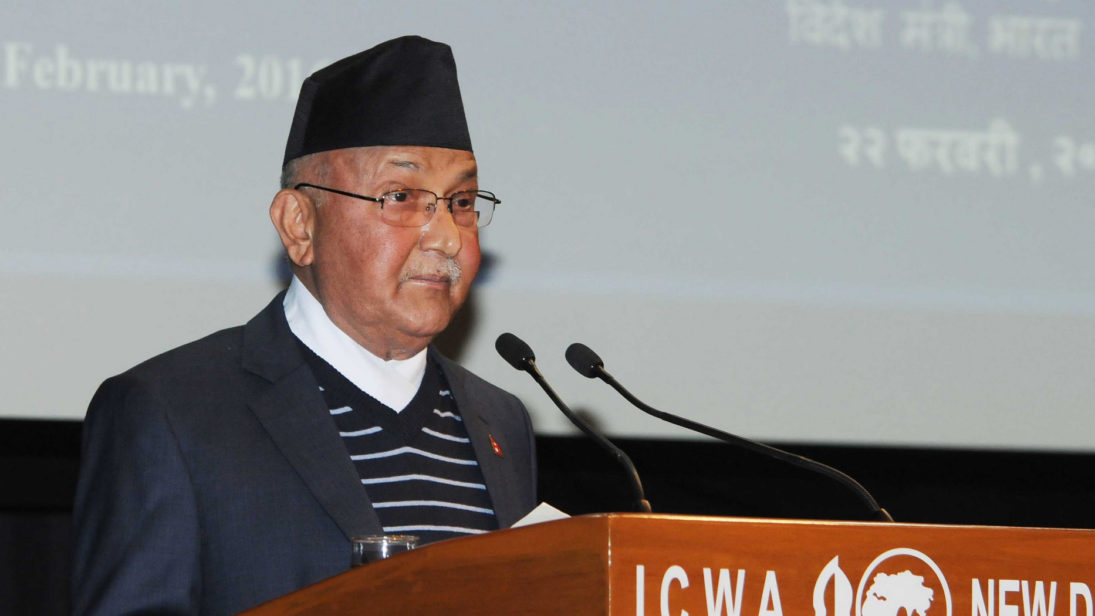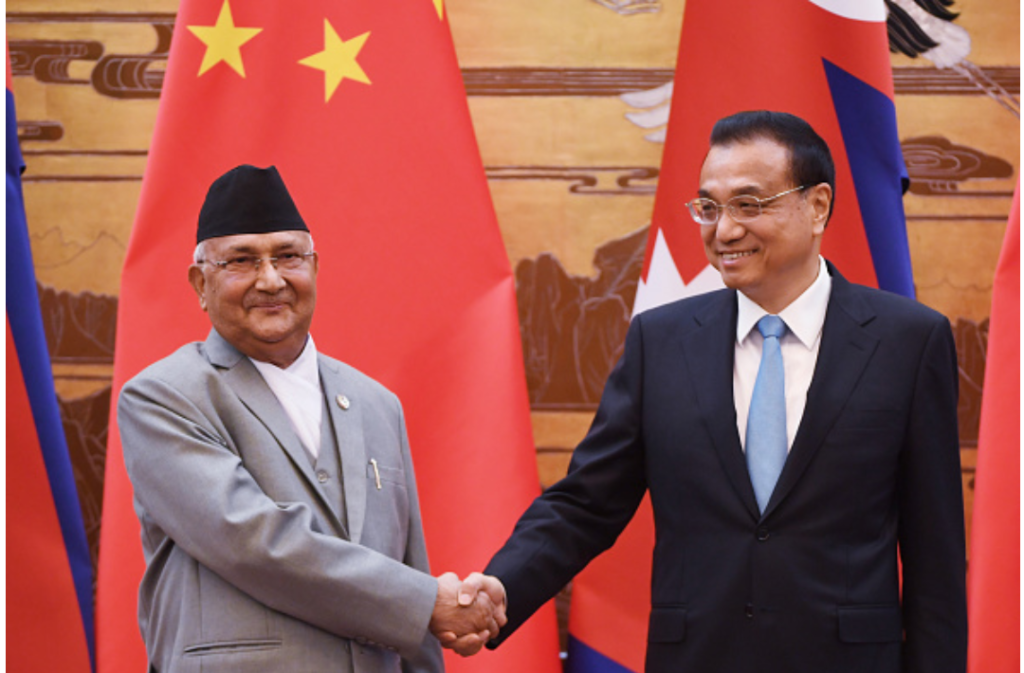
In 2018, Nepal witnessed defining political moments that have set the tone for a future course in the country’s domestic and foreign policy. With a two-thirds vote in Parliament, a strong government led by K.P. Sharma Oli was elected this February under a five-year mandate. This was followed by a unification between the two communist parties of Nepal on May 17th, Communist Party of Nepal-Unified Marxist Leninist (CPN-UML) and CPN (Maoist Center), which gave birth to a new party, Nepal Communist Party (NCP). The incumbent prime minister K.P. Sharma Oli is the 27th prime minister in 28 years; frequent changes of leadership and the resulting political instability have been costly for the country’s economic and overall development. However, this union has brought a single-party majority to parliament, an unprecedented development that marks the end to a long history of coalition governments in Nepal.
Prime Minister Oli’s government could meet the Nepali people’s expectations if it handles foreign and domestic policy smoothly. Although institutional requirements such as strong parliament and government are in place in Nepal, the challenges Oli faces lie in the formulation and implementation of sound policies to maintain good governance, deliver on its promises of socioeconomic development, spur job growth, and attract foreign investment.
UnfulfilledPromises and Internal Rifts
The ruling NCP government was set up with the promise of economic development and prosperity, a long-cherished dream of the Nepali people, who have suffered from chronic political instability for the last three decades. Unfortunately, the government’s performance over the last nine months has been largely dismal, frustrating ruling party leaders. It has been unable to create more jobs to address the pressing issue of unemployment, or promote good governance to root out widespread corruption. At the same time, the government has not formulated laws required for the implementation of federalism such as deploying civil servants at the local level, or the proper allocation of natural resources among central, provincial, and local level. The delay in formulating laws has affected the functioning of the government.
With an underwhelming performance this year, the NCP government has tightened its grip over the media, intellectuals, and civil society. In a recent attack against the press, NCP Chairman Dahal said that the monopoly of big capitalist media must end, adding to suspicions that the government wants to control what is written in newspapers and said on television. Members of Nepal’s politics, academia, and the press have also said that the Prime Minister’s threats on the “intellectual community” are unbecoming of his high office. Thus, there are fears that a communist government with a two-third parliamentary majority could take undemocratic steps and if so, a strong opposition is needed to check these decisions.
Accordingly, the role played by the main opposition party—the Nepali Congress (NC), which maintains deep support from the middle and lower middle classes—in curbing the actions of the NCP government will be closely watched in 2019. In its recent official document, the NC has said that totalitarianism is rearing its ugly head, and that its main duty at this point is to preserve the democratic principles and values enshrined in the constitution. In this context, as the opposition party, the role of the NC is crucial, as it could protest any of the government’s undemocratic measures in parliament and prevent them from being implemented.

LacklusterForeign Policy
While internal rifts prevail, it is unclear how things will progress in terms of foreign policy into 2019. As far as relations with India are concerned, both sides are watching and waiting after going the extra mile to foster an environment of high-level trust with each other. During the early months of the new government, Indian Prime Minister Narendra Modi visited Nepal twice, and there has been frequent engagement between the two countries at the ministerial level. There is an obligation to scrap or amend all bilateral treaties signed with India after 1990, since the Oli government had vowed to amend the 1950 Peace and Friendship Treaty, the bedrock of bilateral relations, in its election manifesto. Suggestions on how to do so have been put forth by the Eminent Persons Group (EPG), a joint group of experts formed two years ago with the purpose of preparing a document on how to redefine bilateral relations in a changed context. The EPG has prepared a recommendations document that has not been made public yet. Media reports suggest that the Indian side has expressed some concerns over portions of this document. Thus, 2019 is going to be a crucial year for the government to fulfill its commitment of reshaping bilateral ties with India.
With regards to China, in September, Nepal and China finalized the Transit and Transport Treaty signed by the two countries in 2016, which allows Kathmandu to use Beijing’s ports and roads for trade purposes. The agreement, at least in principle, effectively ends India’s monopoly on Nepal’s supply system, providing a second option in case of future blockades or other negative measures. To diversify its trade and supply system, Nepal should pay attention to building connectivity infrastructure with China, including through the Belt and Road Initiative (BRI).
China is pressing to finalize BRI projects in Nepal as soon as possible. Although the Nepal government has identified more than three dozen projects under BRI, negotiations remain stalled due to Nepal’s hesitations on financing modalities of the projects. Indeed, Nepal should be very cautious of the economic viability of BRI projects. The NCP government should select projects on the basis of its domestic needs and prioritize accordingly—not on the basis of pressure from China. In this context, Nepal should hold transparent and wider consultations with experts and businessmen about the BRI projects and funding modalities.
TheYear Ahead
Increasing economic investment from neighbors and other countries will remain one of the major challenges for the Oli government. A report published by the World Bank suggests that Nepal needs to improve the ease in which investors can do business in the country. Therefore, a major governmental challenge is to assure the international community that there is an appropriate environment for investment in Nepal. There is a prevailing perception among foreign policy watchers that Nepal is investing too much time in dealing with India and China, obscuring the importance of other countries such as the United States, the United Kingdom, Japan, Australia and other European countries, which remain major development partners of Nepal.
Nepali leaders have traditionally tended to secure support from New Delhi and Beijing early in their tenure, as these two neighbors disproportionately influence the internal political affairs of Nepal. Kathmandu needs to signal that it equally prioritizes relations with other countries by increasing its engagement with countries outside of its vicinity. The government must instead focus on diplomacy for the sake of bringing in economic investment from any willing partner—not just China and India.
The success of the new government will lie in keeping the party united and drawing the confidence of the international community in Nepal’s economic promise. If it fails to handle both issues, it stands to lose popular legitimacy, despite possessing a two-thirds majority in parliament.
Editor’s Note: As 2018 winds down, SAV contributors from India, Pakistan, Afghanistan, Bangladesh, Nepal, and Sri Lanka look back at the year gone by, reflecting on significant political and economic developments in the subcontinent and assessing what these events may foretell about 2019. Read the series here.
Image 1: MEAphotogallery via Flickr
Image 2: Pool via Getty Images


